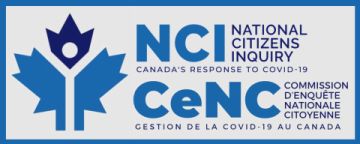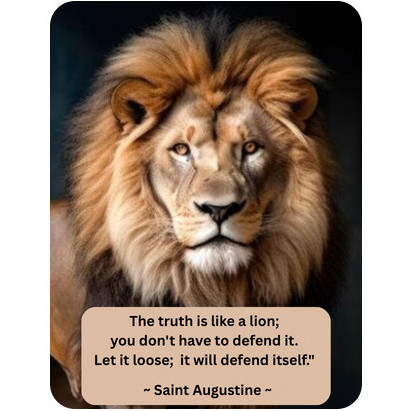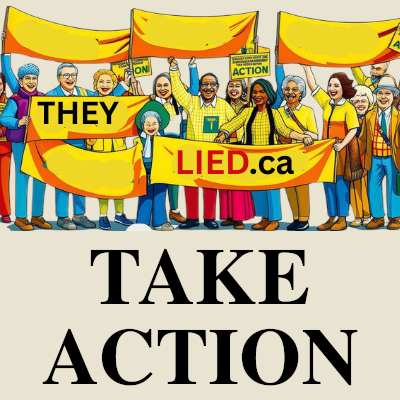Censorship
"Truth is so obscure
in these times, and
falsehood so established,
that,
unless we love the truth,
we cannot know it."
~ Blaise Pascal
in these times, and
falsehood so established,
that,
unless we love the truth,
we cannot know it."
~ Blaise Pascal
"There is no time in history
where the people who
were censoring speech
were the good guys."
~ RFK Jr.
where the people who
were censoring speech
were the good guys."
~ RFK Jr.
The Trudeau government has unveiled the largest censorship plan in Canada which aims to silence everyday Canadians on social media platforms.
Four bills: The Online Streaming Act (formerly Bill C-11), Bill C-18, Bill C-63 and the Online Harms Act, each one building on the other, to build a censorship regime whose only comparison is North Korea. And it's not like any of the mainstream media are actively opposing them - quite the opposite; they're excited about it. Canada is in trouble, and the watchdogs who are supposed to be on guard are all sleeping.
Four bills: The Online Streaming Act (formerly Bill C-11), Bill C-18, Bill C-63 and the Online Harms Act, each one building on the other, to build a censorship regime whose only comparison is North Korea. And it's not like any of the mainstream media are actively opposing them - quite the opposite; they're excited about it. Canada is in trouble, and the watchdogs who are supposed to be on guard are all sleeping.
"Today, Canada has officially become a complete dictator country. Justin Trudeau has officially implemented online censorship to a level that Canada has never seen before and it's creating a lot of panic. A lot of people are very worried as to how this is going to affect their online usage through either YouTube, Netflix or whatever it is. So we're going to take a look at everything. This is really scary folks, like, total total dictator move."
While debating censorship Bill C-11, Canadian senator David Richards said, if it passes, Joseph Stalin would be "looking over our shoulder when we write." Richards also said the bill is "censorship passing as national inclusion."
Having one's feelings hurt is now a criminal matter in the Region of Waterloo.
"By now, you're probably aware that the British government have asked big Tech platforms to censor our online content. This happens in the context of the Online Safety Bill which is a piece of UK legislation that grants sweeping surveillance and censorship powers and it's a law that has already been passed. I also don't imagine you've heard of The Trusted News Initiative (TNI). The TNI is a collaboration between Big Tech and Legacy Media organizations to target, control, choke and shut down independent media organizations. The actual, real rivalry now is not between the BBC and CNN globally, it's actually between all trusted news providers and digital platforms. It's clear that these organizations collaborate in constructing narratives, whether that's around the war or the pandemic."
"A well-intentioned ambition to contain obnoxious elements in society has created a society of an extraordinarily authoritarian and controlling nature. That is what you might call the new intolerance, a new but intense desire to gag uncomfortable voices of dissent."
The European Union says that Russian disinformation is the most active on Twitter. They said that after Elon Musk pushed back on the Digital Services Act (DSA) because it regulates the conduct of large tech platforms. How do they know that Russian disinformation is the most active on Twitter? We saw from the Twitter files that when U.S. politicians asked them to find Russian disinformation, they could not. So where did the E.U. find it? They found it through a "disinformation monitoring start-up" called TrustLab, a partner of the CIA. TrustLab's report does not say that disinformation came from Russia. They do not seem able to prove that. They say that incidents of keywords related to disinformation are high on various platforms in various countries. So, ... EU politicians are spreading disinformation ABOUT disinformation!? Come on guys!
Sam Biddle of The Intercept (Dec. 2, 2022) explains TrustLab in his article CIA venture capital arm partners with ex-Googler's startup to "Safeguard the internet". Trust Lab's murky partnership with In-Q-Tel suggests a step toward greater governmental oversight of online speech.
Sam Biddle of The Intercept (Dec. 2, 2022) explains TrustLab in his article CIA venture capital arm partners with ex-Googler's startup to "Safeguard the internet". Trust Lab's murky partnership with In-Q-Tel suggests a step toward greater governmental oversight of online speech.
The 27 countries who have signed the document are promising to implement "necessary and appropriate measures, including legislation, to address information integrity and platform governance." They will do so in a manner that "complies with international human rights law," including freedom of opinion and expression, the document says. Canada and the Netherlands began working on the initiative a year ago and launched the resulting Global Declaration on Information Integrity Online at the United Nations Wednesday. Signatories include Canada, the United States, the United Kingdom, Germany, Australia, Japan and South Korea, among others. It sets up news media as a tool to fight disinformation.
Also see these articles:
How did Google become the internet's censor and master manipulator, blocking access to millions of websites?
Seven Simple Steps Toward Online Privacy.
Search engines have an intentional bias. See which ones are manipulating YOUR search results.
How did Google become the internet's censor and master manipulator, blocking access to millions of websites?
Seven Simple Steps Toward Online Privacy.
Search engines have an intentional bias. See which ones are manipulating YOUR search results.
The inspirational Tim Ballard of "Sound of Freedom", speaks to Jesse Watters on Fox News about the Globalist Media reaction to the strong box office for the movie. What more proof do you need to see what they are trying to do?
Reporter Emma Jo Morris and Democratic presidential hopeful Robert F. Kennedy Jr. testifies before a House Judiciary subcommittee on the "weaponization of the Federal Government."
Elizabeth Warren and Lindsey Graham will break the internet. The senators say they're creating an "independent, bipartisan regulator charged with licensing and policing the nation's biggest tech companies."
EU content law will be able to shutdown social media platforms after Aug. 25, 2023
... and ...
CBDCs contain features that restrict spending. 130 countries are now piloting or launching CBDCs. Are we heading towards a future of 'convenience' at the cost of our freedom?
U.S. District Judge Terry Doughty dropped a mammoth 155-page opinion on Tuesday that likened the Biden administration to an Orwellian "Ministry of Truth" and ordered numerous top federal officials and agencies to cease all contact with social media firms that could potentially interfere with First Amendment-protected speech.
Censorship, labeling and spying on citizens by the FBI - The House Judiciary Committee grilled FBI Director Christopher Wray over various potential constitutional violations the FBI has participated in. And the re-authorization of FISA (Foreign Intelligence Surveillance Act) Section 702.
Joe Biden and the US government can not use social media companies to quell free speech. Then the New York Times lies about the ruling.

Jerry Managre 7:33:54 - 7:50:58
Lay Witness
NCI volunteer overseeing media and social communications providing insights into the challenges of 'getting the word out'. Jerry delves into the various obstacles encountered in conveying the message of NCI to a global audience and across Canada. Listen to Jerry's overview as he describes the censorship faced by the social media team, and the successful outcomes of spreading the word despite these challenges.
How can you spread the message that They Lied?
Stay up to date with our Newsletter
Click here to read it,
or subscribe below ...
or subscribe below ...
Click here to STOP the Globalist Agenda
Click here to support our work.
Click here to email us at contact@theylied.ca




































